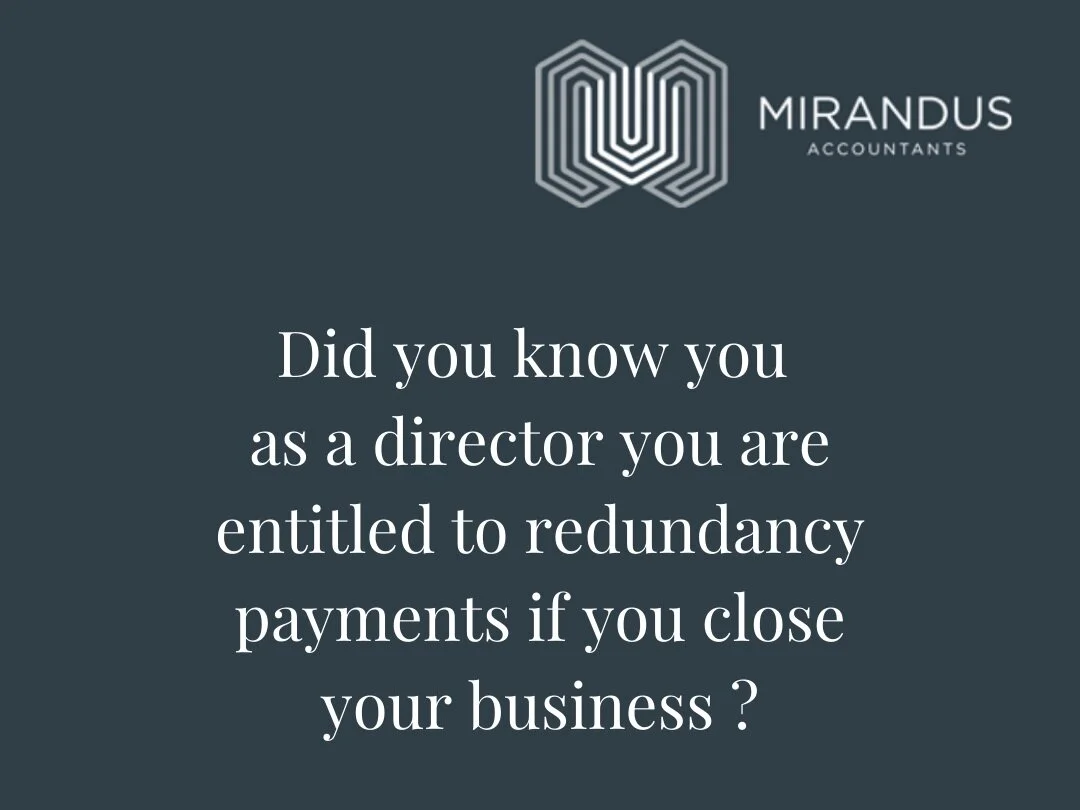Did you know you Directors are entitled to redundancy payments?
As a company director, you may well have some understanding of redundancy payments for your employees but are you aware that a large share of directors are entitled to redundancy payments too?
Limited company directors are indeed eligible for redundancy pay, otherwise known as ‘directors redundancy’ if their company goes into liquidation or is closed down for any reason.
Do you qualify?
Director’s may qualify for a number of statutory entitlements including redundancy pay, potentially providing the much needed cash flow boost at the very time when it is needed the most.
Redundancy payments are paid out based on eligibility criteria and when the director receives the entitlement, the director can make use of the payment to ease financial burdens or indeed start-up a new venture.
The eligibility criteria dictates that if you have been trading for over two years and you are considering closing your company due to financial struggles, including HMRC debts or paying off creditors for example, you may be able to claim director redundancy.
The average claim for director redundancy in the UK is £9,000.
You may also claim for other statutory entitlements such as notice pay, holiday pay and unpaid wages.
Many directors are not aware of these entitlements being available to them.
The other eligibility criteria is noted below:
Director of a UK limited company. Sole traders or partnerships are not eligible for tax-free redundancy payments
Working under a contract of employment for at least two years - whether written, oral or implied, rather than only having a controlling interest
Working a minimum of 16 hours per week
Being owed money by the company – this could be arrears of PAYE for example, or the money you initially invested
How much redundancy pay can I receive?
The amount you’re entitled to as a director depends on your length of service in the company, your age, and your rate of pay.
The rate of gross weekly wages is capped at £525/week and length of time in service is capped at 20 years, and is used as a basis for calculating how much redundancy pay you could receive.
You may also be able to claim unpaid wages of up to eight weeks as well as a maximum of six weeks of holiday pay.
Redundancy payments are based on Earnings. Earnings include salary, wage or fee and tips and payments due to from your employment.
Loans are classed as earnings. It is better for you to repay the loan and the company makes a higher redundancy payment if this can be covered by the £30,000 tax exemption.
Dividends are not classed as earnings unfortunately and are taxed as normal and therefore do not count towards statutory redundancy payments.
Any sums paid into approved pension schemes are already currently tax free but some payments fall into a grey area, so we strongly suggest you speak to a tax specialist. Contact us for advice.
How to make a claim for redundancy
If you do meet the criteria, claims can be made from the National Insurance Fund via the Redundancy Payments Service (RPS), and are tax-free. You can ask for a form or request one online.
Are my redundancy payments taxable?
Up to £30,000 redundancy payment may be paid tax and national insurance free but be careful, other payments other than statutory redundancy need to be looked at carefully in terms of tax payments.
HMRC will levy tax penalties as well as interest if you fail to make the correct calculations.
It is therefore important to calculate other payments due to you as a director and their tax implications.
Mirandus can help with tax liability considerations, get in touch to see how we can help.
Mirandus can help
Our mission is to help businesses manage their finances in ways that best sets them up for success.
We believe that a compliant and tax-efficient business is the foundation for success, and that these areas shouldn’t be barriers to any business growing and achieving what they want to. We exist to remove those barriers, by working in partnership with our clients and providing expert advice every step of the way.



